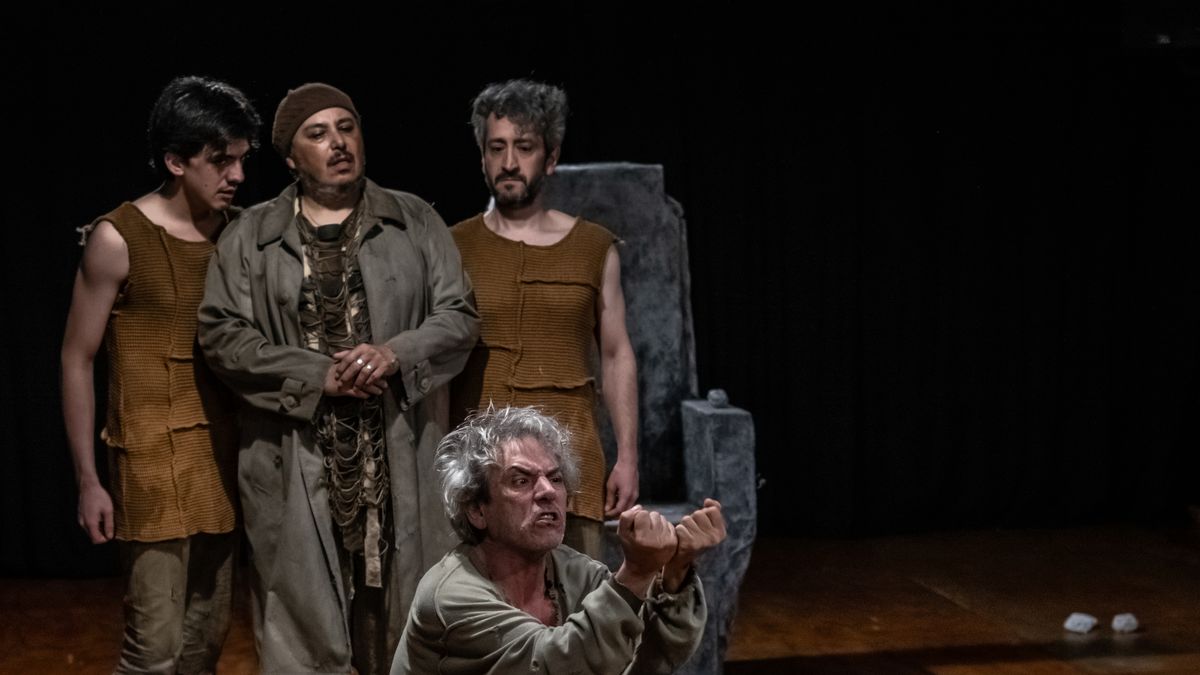“The infinite versions of the tragedy of Caesar is actually a version of the tragedy of humanity.” points out Andres Mangoneauthor and co-director with Antonella Country of “Infinity stone”, free version on “The Tragedy of Julius Caesar” by William Shakespeare.
The cast is made up of Abel Ledesma, Alejandro Benavides, Andrés Mangone, Antonella Pais, Federico Paulucci, Adrián Tufolo and Martin Scarfi, and is presented on Sundays at 8 p.m. at Belisario Club de Cultura, Corrientes 1624. We spoke with Mangone.
Andrés Mangone: The arrival of the new national government and its first weeks encouraged me to mobilize compositional troops on the phenomenon. I remembered The Tragedy of Julius Caesar and confirmed that I could start the attack from there. Luckily I found that faith quickly, sometimes it took a long time, but this author, as for so many theater artists, resolves the starting point for us again and again. This is why I even find Shakespeare’s phrase in the play funny: “How many times will we see Caesar die in a theater?” In some way, the author anticipates that his writing will be rewritten on stage again and again, with countless versions of Caesar’s tragedy, which is actually a version of the tragedy of humanity, like all his tragedies. And even more, it points to humanity itself, repeating its falls with new versions, not Caesar’s, but its own as a whole, as is happening to us now in our country.
Q: Is that why it is recreated around the grotesque?
A.M: Our grotesque tradition, as an expressive language, beyond the excuse of the apparent themes of a work, activates a sacred cry in theatrical terms, about the absurd aspects in the vagaries of our destiny. Our particular language, that of the direction and with this cast that passionately adheres to this artistic policy, is to intervene in the grotesque with compositional instructions for the conscious management in the production of actresses and actors, it is not an unusual force Rather, we are betting on a gradual control of the wild energy accumulated in the individual and collective need to find relief, for the disciplined execution of that savagery. It is very interesting and exemplary, even under the cultural circumstances in which we live, under the pressure of the dominant, bourgeois, atomizing and apathy ideology. The difference generated from the organization, in a form of production, in which one works with a policy, with a dedication based only on the decision to belong to such a phenomenon, and just because, by pure political position, in the total openness in which a theater like this, and like almost all theaters, is produced today.
Q: Is theater your militancy?
A.M: We are a cooperative of eight people, of all ages, associated in a militant event, which organizes a rebellious prank with absolute responsibility and armed with a work plan. I think this is what is exciting, it is in itself, and it is what we surely seek to share, to add to the world, the desire to live, to organize ourselves politically, to agitate from our humble marginality for the seizure of power and composition of reality.
Q: What else can you say about Shakespearean poetics?
A.M: Shakespeare is another machinery of phenomenal display, full of variants, on universal issues that immediately offer the sufficient distances and closeness necessary for a territory in which a theatrical device can play at the exorcization of conjunctural elements as a masquerade of deeper and more profound issues. the relations between both fronts.
Q.: What is the essence of your theater?
A.M: The production machinery of particular theatricality with which we have been working in La Forma, with my director partner Antonella Pais, a derivation in turn of many years of research with Pompeyo Audivert in the El Cuervo studio. This machinery implies an associative process that seeks in rehearsals, through formalist proposals for the occupation of space and time, to place the performance as the axis of the most powerful and innovative final meanings. Therefore, knowing that we always launch ourselves into a high degree of artistic unpredictability, I tend to choose materials that easily connect with the historical circumstances of our people, to establish bridges and connect the poetic fact of the composition with the most ardent with reality.
Q: How did you think about the setting?
A.M: Infinity Stone is our trick, we attack a little piece of space and time with masks. The original work plays with conspiracy as a fiery human element. Us too, because we understand the theatrical event as an operation of occupation and sabotage. Shakespeare says: “-They wear masks because they are actors; “You mean conspirators.” As is, we use masks, theme mask, character mask, even work mask. The light, the scenery, the music, the costumes, all wonderful artistic aspects, to compose a mask, to take care of the maximum objective, that which runs in the resonance of the imprint of performance hitting those walls, the internal wall of the mask, that vault of echoes that give an account of who we really are. Loitering in those latitudes requires these formal conspiratorial operations.
Q: How do you see theater students over these 25 years? How were the artists transformed?
A.M: I consider that we theater artists and students are still asleep, stunned in the face of the bestial attack against our conquests, as is happening to all workers in general. I think that we were more or less co-opted by the assumption of conditions of handouts and a political discourse of containment that exceeded even what it contributed in practice, and that this derivation to a state policy that revels in adjustment cannot yet be assimilated as such, that is, as a necessary derivation, not as another line emerging from a cabbage, because we know that is not the case, we are facing the unveiling of an objective against our interests that did not begin now, but rather has always been there and that It requires us assets.
Q: What is it like doing independent theater? How do you see theater and culture today?
A.M: What interests me in cultural production is, on the one hand, access, its democratization, even as a substantial difference in the quality of life of the population, which of course includes solving basic needs, and not being in this unpresentable catastrophe. in which half the country looks for food in the trash; and on the other hand, its revulsive character, a liberated zone, violating the social front to always agitate activism, that is, the perspective of composition. Composing is for me what characterizes us as a species, and its activation is time and again revolutionary.
Source: Ambito
I am an author and journalist who has worked in the entertainment industry for over a decade. I currently work as a news editor at a major news website, and my focus is on covering the latest trends in entertainment. I also write occasional pieces for other outlets, and have authored two books about the entertainment industry.




